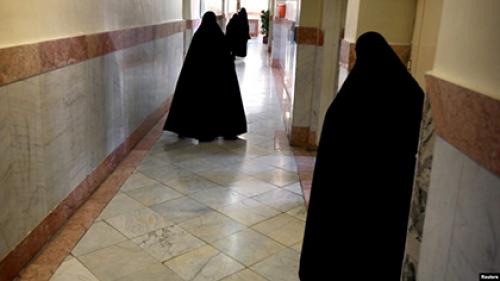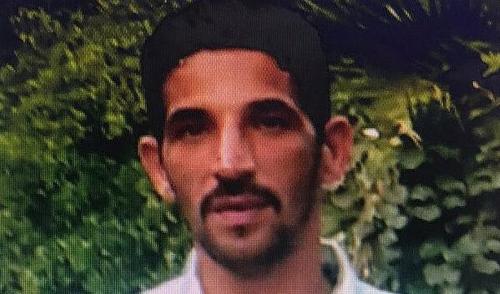13 June 2021 :
Human rights defender Narges Mohammadi says Iranian prison authorities use sexual abuse and harassment systematically to break the will of incarcerated women -- and that she herself has been a victim.
Fear, shame, and a culture of avoidance may keep many victims of such practices from speaking out.
But Mohammadi and other former detainees in Iran shared their experiences during a May 27 group discussion on the Clubhouse social-media app -- an online gathering that also was joined by the exiled Iranian Nobel Peace Prize laureate Shirin Ebadi.
“I felt like a sheep who was thrown into the car,” Mohammadi told the group about her forceful 2019 transfer from a prison in Tehran to the northwestern city of Zanjan.
She said a prison director held her lower body, pushed her into a car, and sat on her legs -- then asked her to light a cigarette for him.
Women Prisoners Targeted
“I can’t diminish this to a physical assault,” Mohammadi told the group. “They target prisoners based on their gender.”
She says she also learned during her time in jail about other female prisoners being harassed and sexually abused -- including one woman who suffered from serious mental problems after being groped by her interrogator.
“I have to ask judiciary chief Ebrahim Raisi himself if I was required to light the cigarette for the prison chief,” Mohammadi told the group. “Did I have to smoke with the head of your prison?”
Mohammadi is the spokeswoman for the Defenders of Human Rights Center, an organization co-founded by Ebadi that is now banned in Iran.
In October 2020, Mohammadi was released early from the 10-year prison sentence she received on charges stemming from her human rights work.
Her release was prompted by concerns about her health as well as calls from the United Nations and international human rights groups.
But less than a year later, she now faces a new sentence of 30 months in prison and 80 lashes on charges of “spreading propaganda” against Iran’s clerical establishment, “defamation,” and “rebellion against the prison authorities.”
She says the sentence is a punishment for her defiance and refusal to remain silent about rights abuses -- including her participation in a prison sit-in protest against a deadly November 2019 crackdown by Iranian authorities against antiestablishment demonstrators.
Mohammadi said that if a person as prominent as her can be so easily mistreated, she worries about the fate of female prisoners who don’t have her public stature.
“I’m a 48-year-old woman. People know me,” she said. “When I saw how they treated me, I kept thinking about how they treat younger [women] who are unknown and are kept in solitary confinement.”
Mohammadi said young female detainees are often forced by prison authorities to undergo virginity tests.
Other female prisoners in recent years also have accused interrogators of sexual harassment and psychological abuse.
Jailed ecologist Niloufar Bayani wrote letters to authorities detailing how she was tortured during 1,200 hours of interrogation.
She says her interrogators threatened her with rape and death, made her imitate the sounds of wild animals, and forced her to take part in their sexual games.
Silence Doesn't Bring Change
The Clubhouse app has provided a new platform for Iranians to connect and discuss wide-ranging issues and, sometimes, to challenge officials who participate in real-time discussions.
Nobel Peace Prize laureate Ebadi, a human rights lawyer in Iran for many years before she was forced into exile, told the May 27 Clubhouse meeting that women should be encouraged to name and shame their abusers.
“Many are not ready to speak out about these things due to their reputation or because they don’t have any hope for justice,” Ebadi told the online meeting.
“Narges [Mohammadi] should be praised for speaking out loud and giving others courage to speak up,” Ebadi said. “Silence doesn’t change anything.”
Several other former prisoners also spoke about experiences of abuse and harassment at the hands of their jailers.
Sexual Intimidation
Human rights activist Maryam Shafipour said she was constantly worried about sexual assault after one of her interrogators threatened her, saying: “I can keep you here and do what I want with you."
“He would thrust the lower part of his body on my chair and make noises,” said Shafipour, who was jailed in 2014 in connection with her human rights activities.
Mahvash Sabeti is a teacher and poet who spent nearly a decade at Tehran’s Evin prison on charges linked to her work running affairs of the Baha’i community in Iran -- a persecuted religious minority whose faith is not recognized in the Islamic republic.
Many Iranian women have said they suffered sexual harassment and abuse in the country's prisons.
Sabeti, who was released from prison in 2017, said she regularly faced gender humiliation there.
“In all the phases of the interrogations, we were looked at as a woman, a second sex,” she explained. “When they asked me to cooperate and I refused, I was told: ‘You’re a woman. You have no courage.’”
Old Scars, Years Of Trauma
The most painful accounts came from women who were jailed during the years shortly after Iran’s 1979 revolution.
Banou Saberi spoke of being raped in 1982 by three men in the desert near the central Iranian city of Isfahan who said they were charged with enforcing Islamic law.
She said that after her arrest in 1986, her interrogators used her rape as a threat to pressure her and her family, including her husband, who was executed in 1988.
“They told my husband that I was a prostitute and I invented this [rape] claim to cover up the fact that I wasn’t a virgin when we got married,” Saberi recalled.
Even after her release, she said Iranian authorities would routinely summon her and insult her with sexual slurs.
Saberi now lives in the United States. She said she still feels traumatized as a result of the psychological abuse she experienced in an Iranian prison more than three decades ago.
"Until a few years ago, whenever I would rent a house, I would look at the closet to see if it was big enough for me to sleep in it at night because I felt so unsafe," she told the group while sobbing.
Monireh Baradaran, a former political prisoner who has published a prison memoir about her years in prison from 1981 to 1991, recounted how her chador fell off her head while she was being flogged by an interrogator.
She said her interrogator shouted at her because he could see her hair. Under Islamic laws enforced in Iran after the 1979 revolution, women must cover their hair and body in public.
"I remember that I passed out," she said. "When I regained consciousness, the first thing I heard was the interrogator telling me: 'You are shameless! Cover yourself up.'"
Baradaran said that during her years in prison, women were equal to men when it came to torture. But she said female prisoners would also face “additional pressure” because of their gender.
Some prisoners have said that they endured rape in Iranian prisons during the 1980s.
There also have been rape allegations from women arrested in 2009 during the state’s crackdown on mass street protests over a disputed presidential election result.
https://www.rferl.org/a/women-sexual-abuse-iran-prisons/31282808.html











